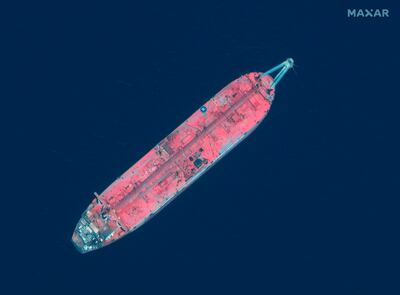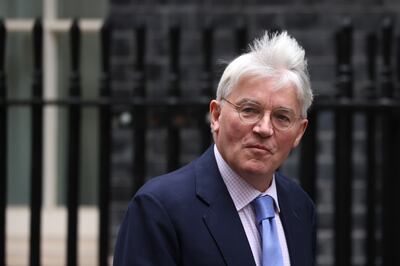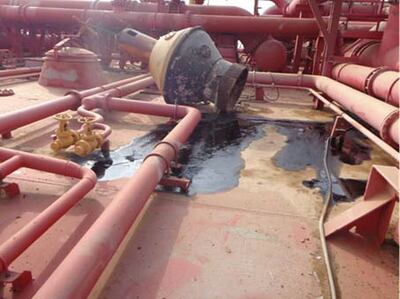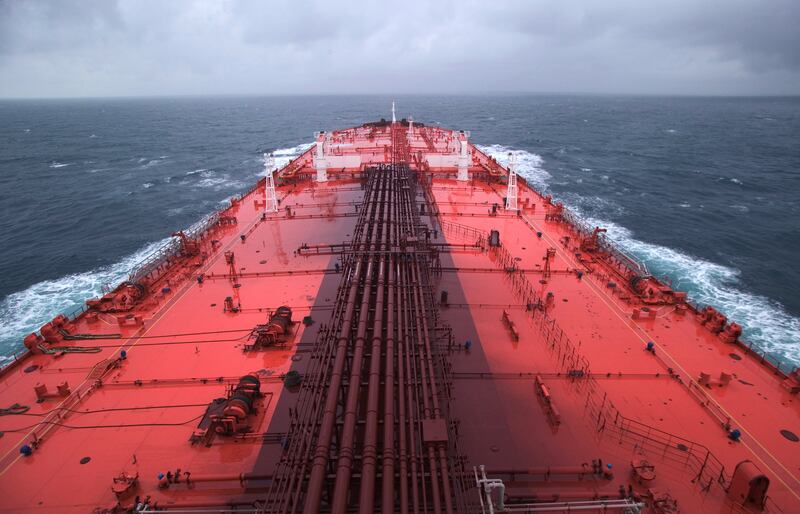British officials leading an international conference on the Safer oil tanker, which is disintegrating in the Red Sea near Yemen, are confident that pledges at a summit on Thursday will meet a UN funding target for a ship-to-ship oil transfer.
Andrew Mitchell, the British development minister, is hosting the pledging summit with Dutch minister Liesje Schreinemacher to call for another $29 million to complete the operation, which would end the seven-year threat of an oil spill four times greater than the Exxon Valdez.

The UK is one of the biggest donors to the $100 million-plus rescue mission for the FSO Safer, a UN-led operation.
Britain is ready to lift its own contribution by a third to $10 million to get the finances over the line, if other pledges are made at the call.
“Be in no doubt, this is a looming ecological and environmental disaster,” Mr Mitchell told The National.
“Cleaning out the spill, were it to happen, would cost up to $20 billion, and spending tens of millions of dollars now obviously saves tens of billions in the future.
“We're very happy that we've got people's attention. We now need to get them to open their wallets.”
The scale of the environmental threat is immense, as is the prospect of a block along world shipping lanes if a spill impeded transit through the Suez Canal.
One tenth of world trade could be blocked in the artery. Add to that the urgency of access to Sudan through the Red Sea.
An oil spill from the cracked tanker, which holds more than a million barrels of Yemen-extracted oil, could increase instability, from the south-western tip of the Arabian Peninsula all the way to Libya.

The transfer operation is a two-stage project with a technical challenge preceding more negotiations on what to do next.
Unloading the vessel would be a first step to resolving a stand-off in which missiles held by Yemen's Houthi rebels are trained on the tanker.
Mr Mitchell told The National that what happens next depends on further negotiations with the armed group that ousted Yemen’s internationally recognised government in 2015.
“The Houthis have missiles pointing at the ship so the ship is not going to go anywhere,” he said. “We need to make the cargo safe and trans-ship it to the replacement vessel.
“Any agreement depends on agreement with those who have missiles pointed at the ship.
“The Saudis now have a dialogue with the Houthis and of course the UN as the special representative of the Secretary General engaged and the [UK] also are engaged through our envoy.”
The roots of the Safer crisis can be traced back to the 1980s when it was commissioned by the country as a storage vessel for oil.
The former Esso Japan was then positioned off Yemen’s Ras Isa peninsula since 1988 as a holding terminal for Yemen’s locally produced oil from Marib.
The condition of the 400-metre tanker has deteriorated over time and it become a pawn in the war. According to the UN it could explode or break up at any time.
Efforts to start the unloading process fell apart in 2019 when the Houthis withdrew from the UN plan in 2019.
It is now scheduled to resume this month with the arrival of the Nautica, a very large crude carrier (VLCC), which set sail from Zhoushan, China, last month.
Soaring costs played a role in prompting Mr Mitchell’s meeting on Thursday. The charter rates for VLCCs have leapt since Russia invaded Ukraine in February 2022.
The costs of inaction loom over the UN’s estimate that the mission is now going absorb about $129 million when its previous commitments were $95 million.
An oil spill would result in the immediate closure of the key port of Hodeidah, which would block supplies of vital humanitarian aid to 17 million Yemenis.

Fishing communities on Yemen’s Red Sea coast would face catastrophe, with 200,000 livelihoods wiped out.
Mr Mitchell is urging his colleagues who arrive at the meeting on Thursday to consider the regional implications of not finishing the task of emptying the Safer.
“It would worsen the already devastating humanitarian crisis in Yemen and likely close ports importing life-saving supplies,” he said.
“Bear in mind that many of the countries who we are seeking to get donations from are delivering aid into Yemen, so they obviously care about it and they would be greatly hampered by a spill.”
Hanging over all regional diplomacy is the need to build on the ceasefire between the warring factions in Sudan, where Mr Mitchell as Africa Minister has been playing a key role in evacuating almost 3,000 people.
Efforts to engage the warring generals in Khartoum revolve around humanitarian concerns since there were already 16 million people in the country who depended on support from outside.
Mr Mitchell warned that the “sinews of humanitarian relief” have already been withdrawn.
“The position is absolutely critical and absolutely dependent on the two generals stopping this fight for power and to agree to a permanent ceasefire, so that we can both address humanitarian issues and get to political talks about a civilian regime taking over,” he said.
“I think the pressure on them is unprecedented but they are in Sudan so they will hopefully listen to what everyone outside has unanimously said.”







